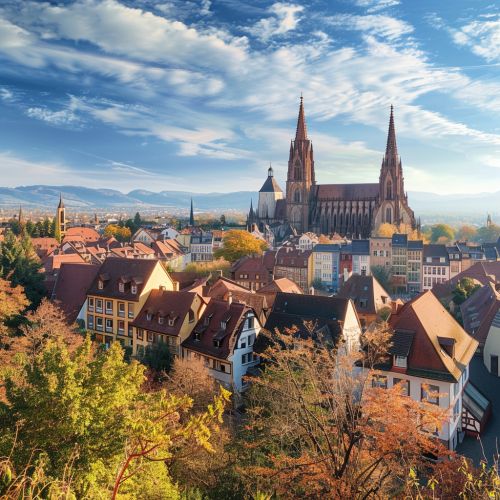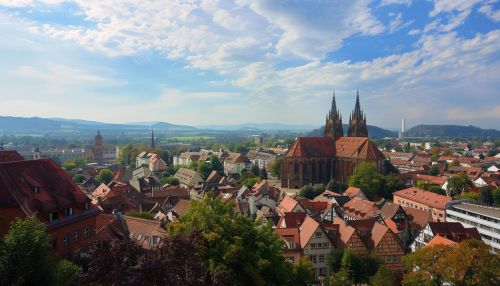Freiburg
History
Freiburg, officially known as Freiburg im Breisgau, is a city in Baden-Württemberg, Germany with a rich and complex history. The city was founded in 1120 by Konrad and Duke Berthold III of Zähringen as a free market town. The name "Freiburg" translates to "free (or independent) town," reflecting its status. The city was strategically located at a junction of trade routes between the Mediterranean and the North Sea regions, and the Rhine and Danube rivers.


The city's architecture bears witness to its history, with structures dating from different eras. The Freiburg Minster, a gothic cathedral, was constructed in the 1200s and is one of the city's most prominent landmarks. The city's fortifications, built in the 1600s, were largely destroyed in the 19th century, but some remnants can still be seen today.
Freiburg has been a center of learning and academia for centuries. The University of Freiburg, founded in 1457, is one of the oldest and most respected universities in Germany. The city is also home to several other institutions of higher education, including the University of Education, the Catholic University of Applied Sciences, and the Protestant University for Applied Sciences.
Geography and Climate
Freiburg is located in the southwest of Germany, near the borders with France and Switzerland. The city is situated in the Dreisam valley, surrounded by the Black Forest, and has a diverse natural environment.
Freiburg's climate is classified as an oceanic climate, with warm summers and mild winters. The city is known for its sunny weather, with more annual sunshine hours than most other cities in Germany. The city's location in the Rhine valley also contributes to its warm climate.
Economy
Freiburg's economy is diverse and robust, with strong sectors in education, research, information technology, and renewable energy. The city is known for its commitment to environmental sustainability, and is often referred to as Germany's "eco-capital". Many businesses in Freiburg are involved in the green economy, including solar energy companies and sustainable construction firms.
The city is also a major center for tourism, with many visitors drawn to its historic architecture, beautiful natural surroundings, and vibrant cultural scene. The city's tourism sector contributes significantly to its economy.
Culture
Freiburg has a vibrant cultural scene, with a wide range of events and festivals throughout the year. The city is known for its music scene, with the Freiburg Baroque Orchestra and the SWR Symphony Orchestra based in the city. The city also hosts several music festivals, including the Zelt-Musik-Festival, one of the largest in Germany.
The city is also home to several museums, including the Augustiner Museum, which houses a collection of art and artifacts from the Middle Ages to the Baroque period, and the Freiburg Museum for City History, which provides a comprehensive overview of the city's history.
